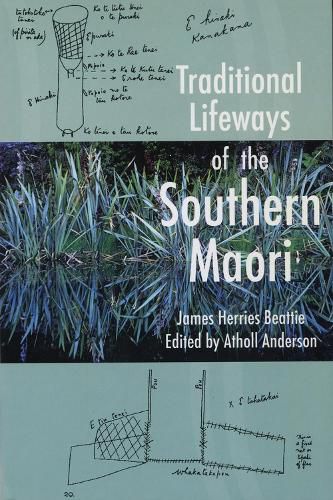Readings Newsletter
Become a Readings Member to make your shopping experience even easier.
Sign in or sign up for free!
You’re not far away from qualifying for FREE standard shipping within Australia
You’ve qualified for FREE standard shipping within Australia
The cart is loading…






Journalist and researcher Herries Beattie worked with Southern Maori for almost fifty years and produced many books. With a strong sense that traditional knowledge needed to be recorded, in 1920 he interviewed people from Foveaux Strait to North Canterbury and from Nelson and Westland, with Otago Museum support. He then transcribed notebooks lent to him by his informants, visited the Museum with them, recording southern names for fauna and artefacts, travelled to traditional sites, and consulted the work of earlier researchers. Finally he worked his findings up into the systematic notes which eventually became MS 181 in the Hocken Library, a highly valued but increasingly fragile treasury of knowledge. This was first published by Otago University Press in 1994 and is now reprinted with a new cover. Editor Atholl Anderson introduces the book with a biography of Beattie, a description of his work and information about his informants. This book is a wonderful source of information, unique in New Zealand literature. As Tipene O'Regan writes in his foreword, ‘Ngai Tahu will be the richer for the emergence of this remarkable text. Maori studies, in general, will be the richer. The texture of southern knowledge will be better etched in our landscape’.
$9.00 standard shipping within Australia
FREE standard shipping within Australia for orders over $100.00
Express & International shipping calculated at checkout
Journalist and researcher Herries Beattie worked with Southern Maori for almost fifty years and produced many books. With a strong sense that traditional knowledge needed to be recorded, in 1920 he interviewed people from Foveaux Strait to North Canterbury and from Nelson and Westland, with Otago Museum support. He then transcribed notebooks lent to him by his informants, visited the Museum with them, recording southern names for fauna and artefacts, travelled to traditional sites, and consulted the work of earlier researchers. Finally he worked his findings up into the systematic notes which eventually became MS 181 in the Hocken Library, a highly valued but increasingly fragile treasury of knowledge. This was first published by Otago University Press in 1994 and is now reprinted with a new cover. Editor Atholl Anderson introduces the book with a biography of Beattie, a description of his work and information about his informants. This book is a wonderful source of information, unique in New Zealand literature. As Tipene O'Regan writes in his foreword, ‘Ngai Tahu will be the richer for the emergence of this remarkable text. Maori studies, in general, will be the richer. The texture of southern knowledge will be better etched in our landscape’.